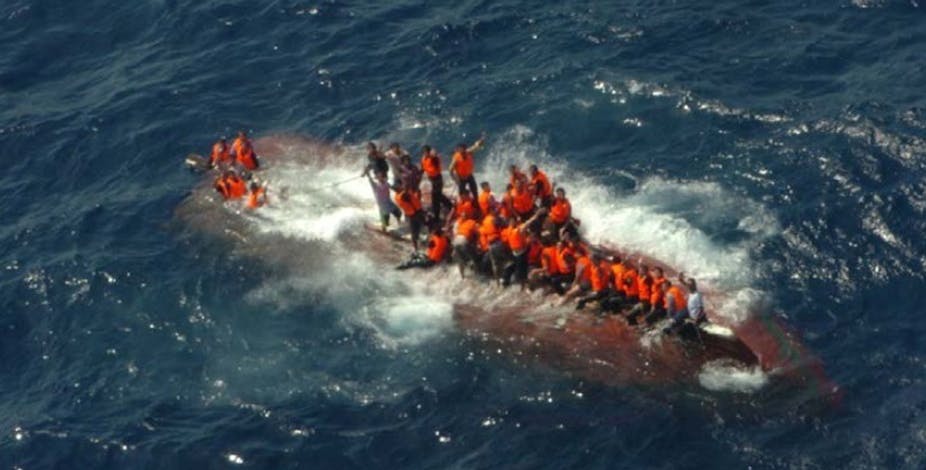Australia’s relations with Indonesia are at risk if the political discourse in this country continues to focus on border security issues expressed through domestic-driven, vote-garnering and media-grabbing slogans such as “stop the boats” and “turning the boats back”.
Simplified slogans such as these that do hardly any justice to the complexity of the issue at hand are circulated uncritically in the Australian media with regularity and frequency. While they arguably may have political mileage at home, they are indeed damaging to Australia’s foreign relations abroad, especially with Indonesia.
The follies and pitfalls of such sloganeering were addressed recently at a two-day Australian-Indonesia Dialogue in Melbourne hosted by La Trobe’s Centre for Dialogue on 25 and 26 June, which involved several prominent scholars, diplomats, and business leaders from the two nations.
One highly ranked Indonesian diplomat noted that “megaphone diplomacy”“ by some Australian politicians and media commentators was hurting the otherwise cordial relations between Australia and Indonesia. While Kevin Rudd’s statement that the Coalition’s "towing the boats back” policy may result in conflict with Indonesia was lambasted as inflammatory, there is sadly some truth in the warning (if we accept “conflict” to mean discord rather than simply violent confrontation).
The common view articulated at the Dialogue was that we will need to deepen our understanding of each other and foster greater social, cultural and economic relations between our two countries. But most importantly we must not take our relations for granted. They require constant nurturing through “face-to-face” dialogue, involving frank conversation and compassionate listening.
It was also stressed that the relations must be widened beyond narrow bilateral trade and security issues, to entail collaborative engagement in dealing with such pressing global and regional issues as climate change, threats posed by disease and ecological problems and food security.
Importantly, Indonesia should not be treated as a puppet in the wayang kulit (traditional Indonesian shadow play) combative play between the two main political parties in Australia.
Another significant observation made at the Dialogue was the fundamental change in the nature of the interdependency between Australia and Indonesia. As one Australian Indonesianist stated, “Canberra needs Jakarta more than Jakarta needs Canberra”. This is not a sentiment that is widely acknowledged, but in fact, still appears to be the dominant mindset in Australia which perceives Indonesia as a developing country in need of aid and assistance. Hence, the view that Indonesia is obliged to help Australia secure its borders and solve the problem of “people smuggling”, that Indonesia will help Australia to “stop the boats”. Australians will need to rethink the way it engages with its northern neighbour.
There was a unanimous view expressed at the Dialogue that a new regional approach, one that is grounded in equal, respectful and collaborative engagement, was needed to solve the myriad problems confronting Australia and Indonesia, be it population movements, food and environmental security, or terrorism.
But this begs the question: why is it in Australia’s interest to nurture and deepen its relations with Indonesia? First of all, we will have to consider the bread and butter, or to be more appropriate, beef, matters.
If the economic forecasters are right, Indonesia will be the fifth largest economy by 2050 and the third largest in Asia after China and India. But even if they are wrong, they are not likely to be very much off the mark given Indonesia’s impressive economic performance to date. Like China and India, Indonesia has a rapidly expanding middle class with a growing appetite for the sort of products that Australia produces and will bring in more tourist dollars than it already contributes.
Another factor to consider is that Indonesia has emerged as a dominant member nation of ASEAN. In effect, closer ties with Indonesia would help Australia strengthen its relations with ASEAN, a regional architecture that will be economically and diplomatically a significant force in the Asian Century.
For Australia to be well positioned in the “Asian Century” it will have to improve and expand its relations with its immediate Asian neighbours. Travelling on the “same boat” with Indonesia and ASEAN, Australia will sail well in its economic, social and strategic engagement with the Asian super-powers, China and India. But there is much work to be done in improving the relations between Australia and Indonesia.
There was a consensus at the Dialogue that it is not the quantity but the quality of the engagement that needs to be enhanced. Australia will need to invest more in improving its knowledge and understanding of Indonesian history, society, culture and economy. But let’s start by stopping the slogans and replacing “megaphone diplomacy” with constructive dialogue.

